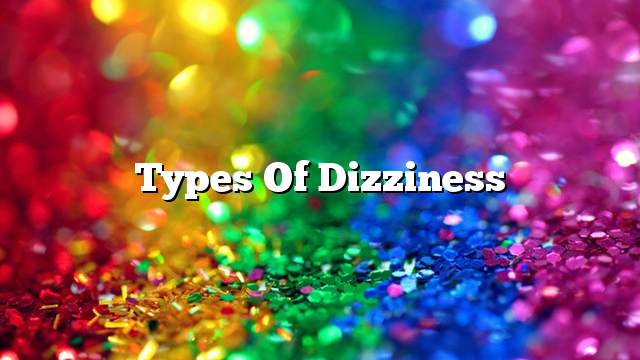Dizziness
Dizziness is defined as weakness in perception and imbalance, which weakens the ability of the patient to continue standing or moving, which affects his activity and achievement; because it increases his sense of laziness, less desire movement, and may sometimes lead to some health problems, such as falling And the incidence of fractures or bruises, and it must be noted that the dizziness of several types will inform you in this article.
Types of dizziness
Transient dizziness
Is a transient feeling of dizziness, occurring for short periods and then disappears, as a result of standing in high places, which leads the person to stick to things around him to maintain his balance, and it should be noted that this dizziness affects those who are afraid to stay in high places.
Sudden dizziness
It is sudden, dizziness, short-lived, and may last for an hour or two, as a result of sudden standing after prolonged sitting or as a result of rapid recovery from bed after sleep.
Continuous dizziness
The patient remains in this type of dizziness lying down for consecutive days for fear of losing balance and falling to the ground. It should be noted that this dizziness has negative effects as a result of a health problem.
Severe dizziness
This type of dizziness is associated with nausea, tinnitus and earaches, where the sufferers have been bedridden for several weeks because they can not get up because they feel the earth is spinning. This is the result of the movement of the vessels. The person suffers from disorders in the internal ear balance. Vomiting, headaches, lashes, sweating, flying on airplanes, or rising to very high places, and then suffering from a drop in oxygen. It should be noted that those suffering from lung and heart disease should see a doctor before going to such places .
Causes of dizziness
- Anemia, due to iron deficiency, or lack of vitamin B12.
- Infections of the inner and middle ear.
- High pressure or drop.
- Decreased amount of salts in the blood.
- Heartbeat disorder.
- High in blood sugar, or low.
- The occurrence of stiffness in the arteries of the brain and heart.
- Take diuretics, analgesics, antibiotics, antidepressants, or antihistamines.
- Low oxygen content in the blood, high in hemoglobin ratio.
- Severe diarrhea.
- Internal bleeding in the digestive system, or in the womb.
- Head injuries.
- Inflammation of the sinuses or breathing ducts.
- Take drugs and alcohol.
- Lack of sleep, stress, and exposure to other psychological factors.
Treatment of dizziness
- Treating the main cause of dizziness, such as treating high blood pressure, or ear infection, or falling sugar, or treating sinuses.
- Stop taking painkillers.
- Stay away from drinking drugs and alcohol.
- Consult your doctor if necessary.
- Avoid sudden change of position.
- Take dizziness medicines and prescription.
